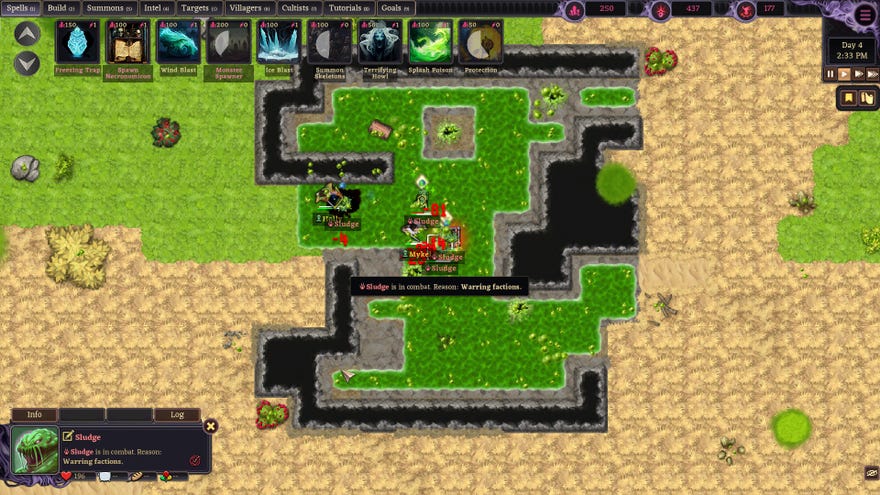The Rally Point: Ruinarch is a novel toy but a disappointing asymmetrical strategy game
Fiending for yourself
Ruinarch is based on a concept many of you have thought of at some point. What if, instead of building up villages and hunting down hostile monsters and evil overlords, you were playing as the Dark Lord?
It's been done most famously in Dungeon Keeper or Overlord, but those were quite conventional structurally. Sure, you were playing as the baddies, but still doing mostly the same things as in other games, twirling your moustache the whole time. Ruinarch feels not like one of those thematic remixes of an established structure, but an attempt to build a new subgenre. Now that it's reached a full release, it also, sadly, feels like a demonstration of how difficult that really is.
A handful of human or elf villages are generated on a randomised 2D map, along with a variety of caves and ruins, some of which are occupied by wild animals or monsters. Somewhere on that map you also place your portal, a seat of power around which you'll gradually build a base. New buildings and spells unlock as you gather enough resources, but not wood or gold. You become more powerful via chaos orbs, little purple blobs that appear whenever you harm the innocent villagers. The goal varies with the game mode, but you'll be gathering as many chaos orbs as possible regardless, since they unlock new powers, and generally act as a measure of how much trouble you're causing, the real point of the game.
The comparison that comes to mind is Shadows Of Forbidden Gods, but where that was more like a grand strategy board game, Ruinarch has more in common with The Sims, as played when you're feeling vengeful. It's an evil dollhouse, an ant farm where you're not only allowed, but encouraged to torment the ants. Each villager has their own relationships, quirks and flaws, and if unmolested will go about their days and nights as you'd expect in a life sim. They eat, gossip with friends, go hunting, drink from the well, flirt with a neighbour, sing a song, get abducted by a giant spider. Normal villager things. They'll even expand the village over time as more immigrants come, and potentially leave to build new villages, form new factions, become outcasts or even bandits.
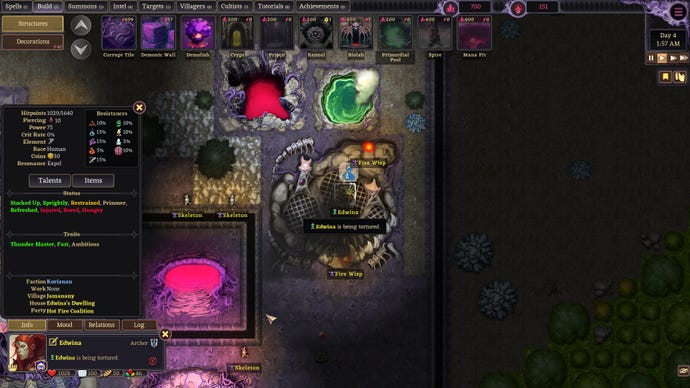
Of course you'll want to keep them under control, though. The more powerful they get, the more dangerous they are to you. But also the more benefit there is in corrupting them to your cause, or turning them on each other. Three demonic archetypes determine your general playstyle: the brute force of demons who raid and kill with monster lackeys, the messy pestilence of the plaguemaster, or the more subtle puppetmaster. Although each can get access to randomised spells or buildings from the others each time you level up your portal, the archetype system feels a little arbitrary, and each has some spells that are niche at best and others that are indispensable. The first two also feel rather one note, as nothing they get is as entertaining or variable flexible as the puppetmaster's ability to spy on the people.
Placing an evil eye in a village gives you a constant feed of extra information on what everyone nearby is doing. Each time villagers interact or do something notable, the puppetmaster can record it as "intel", and then whisper it in someone's ear to upset or enrage them. You can sow a fair bit of distracting discord with this right out of the box, but can also generate gossip by directly interfering with villagers, afflicting them with curses and vices, from low-impact ones like sloth to extreme, potentially self-perpetuating ones like vampirism. Build a prison and you can kidnap them from their beds, and torture or brainwash them to form a cult in your name. Cultists can even fabricate evidence against people of your choosing, getting innocent people kicked out and pushed into banditry, or even executed (and then, perhaps, raised as undead). Then there are more direct spells for creating monster lairs to keep the adventurous types busy, or plain blasting troublemakers if you're in a tight spot.
It all sounds like terrific fun, and it sort of is. But it's also very limited. It's not more than a few games before it becomes clear that as a strategy game it doesn't quite work. You're either keeping a low profile and thus not doing all that much, or you're causing enough open devastation that the people quickly retaliate and there's not all that much you can do but massacre everyone. Which leads into another problem: massacring everyone is boring and easy. Be it by poisoning the well or burning and crushing with spells and raids, it's plain brutish compared to the schadenfreude of manipulating them into destroying themselves with suspicion and resentment, which really feels like it should have been the main focus of the game. I mean, what sounds more fiendish to you: burning down the village, or afflicting a farmer with kleptomania, whispering shameful secrets in the miner's ear every night, and spreading rumours of vampires in the neighbouring village until they start a feud, unaware that the real vampire is their own priest?
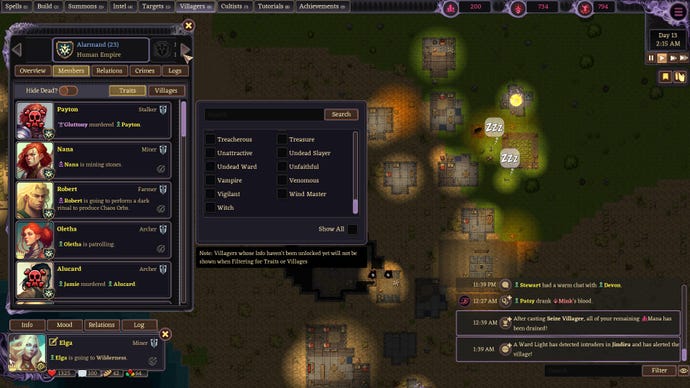
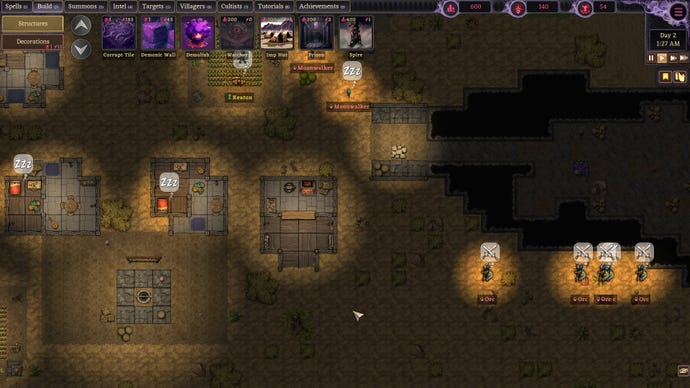
Even doing all that, you'll soon find that the AI makes things rather unreliable. Your own cultists wander off to pray in secret, generating orbs for you, but will sometimes do it in plain sight and get themselves killed. Minions you send to kidnap someone will walk directly through a town square on the way out. A bandit you carefully nurtured will attempt to attack an entire village on her own. It all gets a bit repetitive, too, as fun as the chaos is. Most of the interesting powers come with lengthy cooldowns, thus a lot of waiting around, and your resource management feels perfunctory - mana powers most things but regenerates automatically, which, fine. The other two resources are so abstract that I can't even remember which is which, nor why they're separate save that one of them (I want to say 'spirit energy'?) is required to upgrade your portal. But it's also used to build, which means building more than the bare minimum base just slows you down, to little benefit (the best defence by far is simply not letting anyone get close, rather than hope your rather stupid lackeys happen to blunder into an intruder).
To its credit, Ruinarch tries to prevent complacency by limiting how many chaos orbs any given activity generates, forcing you to vary your tactics a little. But it still feels like it's failed to solve the fundamental problem: asymmetrical strategy games are really hard to make compelling as more than entertaining toys. Strategy players, perhaps even more than most, are prone to doing what's most efficient rather than most in character or funny, and Ruinarch just feels dissatisfying and unfocussed if you're not playing it just to see what you can get the ants to do. Even winning a game often feels anticlimactic
Shadows of Forbidden Gods has this problem to a degree too, but its gods are more distinct and varied, and its use of a Chosen One nemesis character gives it direction where Ruinarch gives you another guy you can just kidnap or blast with lightning. Skyward Collapse was similarly boring if played efficiently and cautiously, but its system of unleashing chaos and countering it with more chaos gave it a momentum that Ruinarch lacks.
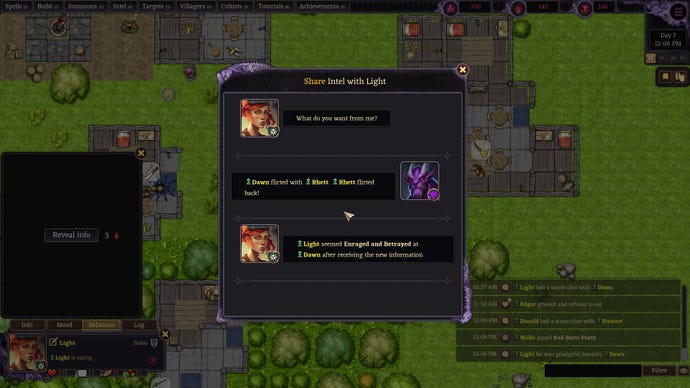
There's definitely room for more games to explore this sort of subtle strategy scheming. Not just (or necessarily) being the baddies, but really having to play a different game to your victims. AI War comes to mind, perhaps counter-intuitively, as it's all about building up in secret, but that comes with constant pushback and localised resistance, so you're always fighting and planning rather than waiting around. It's a difficult thing for strategy games in particular to get to grips with though, and often antithetical to the typical power fantasy most players expect. That perhaps puts such games at a disadvantage to begin with, especially in the era of algorithm worship, where niche games can be obliterated just by picking up the wrong audience.
That appears to have happened to Ruinarch, unfortunately, judging by the absolutely brutal plummet in approval it's had from Steam users since release. Many accuse it of being "abandoned" (it's clearly not), or released too early (it... probably was?), but a consistent sense of disappointment abounds. I'd love to defiantly declare here that everyone's wrong and this is a misunderstood work of genius, but while I think it deserves better than it's currently getting, it does feel like its loose design has failed to do justice to its ideas.
It's a damn shame. Maybe the whole 'evil overlord' concept works best exactly as in Dungeon Keeper; as an entirely thematic dressing for a conventional design. Perhaps screwing with the AI and cackling is always going to be a software toy rather than a game in the typical sense, and Ruinarch is at least fun if approached in that way. But there's the germ of something almost entirely new in there, and I hope some future studio manages to bring it to light.
